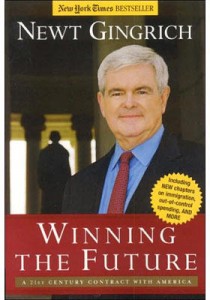SEE UPDATE BELOW.
Dave Weigel is a history buff:
[Newt Gingrich’s] last full-on grapple with Romney came when the former governor attacked him, in a sort of more-in-sorrow-than-anger way, for saying that the Palestinians were an “invented people.” That, said Romney, was complicating things for Israelis.
“The Israelis are getting rocketed every day,” snorted Gingrich. “We’re not making life more difficult. The Obama administration is making life more difficult.” Plus, he was right on the facts. “Palestinian did not become a common term until after 1977.” That’s the sort of knowledge-bomb that Republicans dream of dropping on Obama—they feel like this is right, but here’s a candidate who can say so.
I suppose we could argue over the definition of “common term.” I did a very fast, very lazy search for “Palestinian” on EBSCOhost. Five seconds’ work turned up references to Palestinians — in the Oxford English Dictionary sense of “an Arab born or living in the area of the former mandated territory of Palestine; a descendant of such an Arab” — going back to 1922.
 That earliest reference was in The Nation, which used the term fairly often in the Twenties. But maybe The Nation lacks the common touch. What about Time magazine? Is that common enough for Newt and Dave? The magazine recommended by four out of five dentists began using “Palestinian” in the relevant sense in 1951. For a while, Time used it only before “Arab,” if that makes any difference, but as early as November 1957 the Arab part seemed to be understood:
That earliest reference was in The Nation, which used the term fairly often in the Twenties. But maybe The Nation lacks the common touch. What about Time magazine? Is that common enough for Newt and Dave? The magazine recommended by four out of five dentists began using “Palestinian” in the relevant sense in 1951. For a while, Time used it only before “Arab,” if that makes any difference, but as early as November 1957 the Arab part seemed to be understood:
At one time Egypt’s Gamal Abdel Nasser commended himself to the world as a strongman of reason, more concerned to put his impoverished country on its feet than to stir trouble in the Middle East. But Nasser has increasingly resorted to the incendiary propaganda of the totalitarian dictator, has persistently used his radio Voice of the Arabs to incite the Palestinian refugees in Jordan, who brood in bitter idleness over their lost lands across the border in Israel.
By November 1960, Time considered “Palestinian” a noun:
Last week Pakistan’s Moslem President Mohammed Ayub Khan arrived in Cairo and throwing away a diplomatically phrased set speech, delivered the sharpest criticisms of Moslems by a Moslem heard in many a year.
Ayub spoke plainly on his view of the long-festering problem of refugees along the Israeli border, where more than a million Palestinians—those who fled or were ejected by Israel, and the children born to them since—still inhabit squalid detention camps in Jordan, Syria and the Gaza Strip.
In fairness, I have yet to discover the first use of “Palestinian” in Highlights or the works of Michael Bay, so you can keep believing Newt Gingrich if you like.
Weigel link via Daniel Larison.
UPDATE: Dave Weigel, to his credit, has revised the article in question.





